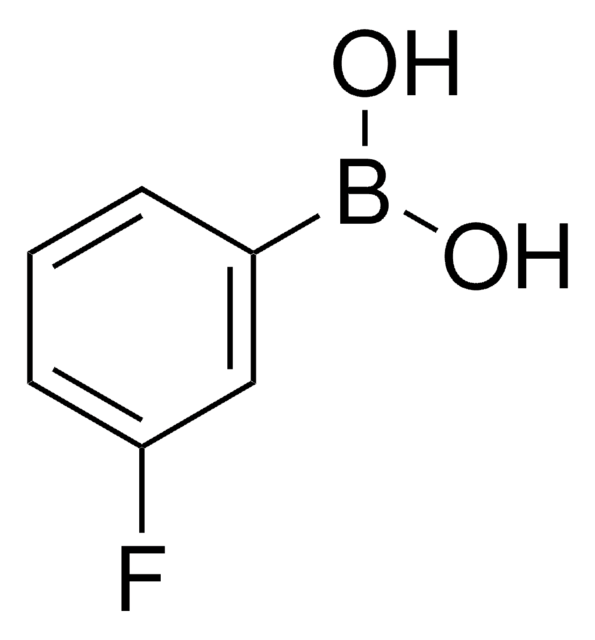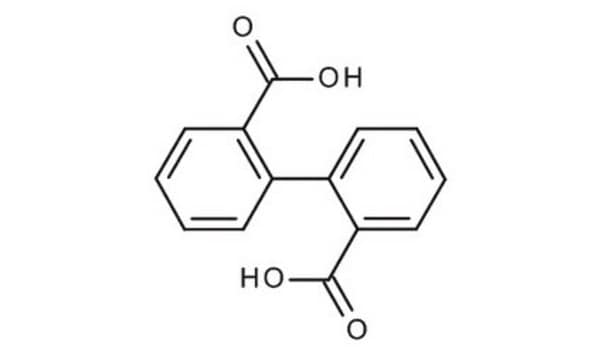517763
2,2′-Bipyridine-5,5′-dicarboxylic acid
97%
Sinónimos:
6,6′-Binicotinic acid
About This Item
Productos recomendados
assay
97%
mp
>360 °C (lit.)
functional group
carboxylic acid
SMILES string
OC(=O)c1ccc(nc1)-c2ccc(cn2)C(O)=O
InChI
1S/C12H8N2O4/c15-11(16)7-1-3-9(13-5-7)10-4-2-8(6-14-10)12(17)18/h1-6H,(H,15,16)(H,17,18)
InChI key
KVQMUHHSWICEIH-UHFFFAOYSA-N
¿Está buscando productos similares? Visita Guía de comparación de productos
General description
Application
- Zn-MOFs Containing Pyridine and Bipyridine Carboxylate Organic Linkers and Open Zn2+ Sites: This study discusses the synthesis and characterization of Zinc-based Metal-Organic Frameworks (MOFs) utilizing 2,2′-Bipyridine-5,5′-dicarboxylic acid as a linker, showing potential applications in gas storage and separation (J Kim et al., 2015).
- Ethylene oligomerization in metal organic frameworks bearing nickel (ii) 2, 2′-bipyridine complexes: Reports the use of 2,2′-Bipyridine-5,5′-dicarboxylic acid in Nickel-based MOFs for catalyzing ethylene oligomerization, highlighting the versatility of MOFs in catalysis (MI Gonzalez et al., 2017).
- Two 3-D metal organic frameworks containing 2, 2′-bipyridine-5, 5′-dicarboxylic acid: synthesis, structure, and magnetic properties: Discusses the synthesis and magnetic properties of two 3-D MOFs built with 2,2′-Bipyridine-5,5′-dicarboxylic acid, demonstrating potential for advanced material applications (M Fang et al., 2014).
signalword
Warning
hcodes
Hazard Classifications
Eye Irrit. 2 - Skin Irrit. 2 - STOT SE 3
target_organs
Respiratory system
Storage Class
11 - Combustible Solids
wgk_germany
WGK 3
flash_point_f
Not applicable
flash_point_c
Not applicable
ppe
dust mask type N95 (US), Eyeshields, Gloves
Elija entre una de las versiones más recientes:
Certificados de análisis (COA)
¿No ve la versión correcta?
Si necesita una versión concreta, puede buscar un certificado específico por el número de lote.
¿Ya tiene este producto?
Encuentre la documentación para los productos que ha comprado recientemente en la Biblioteca de documentos.
Los clientes también vieron
Nuestro equipo de científicos tiene experiencia en todas las áreas de investigación: Ciencias de la vida, Ciencia de los materiales, Síntesis química, Cromatografía, Analítica y muchas otras.
Póngase en contacto con el Servicio técnico







![[Pd(OAc)2]3 reagent grade, 98%](/deepweb/assets/sigmaaldrich/product/structures/508/249/99a0ef2c-b77c-4d73-8ed9-0cca05b6b41f/640/99a0ef2c-b77c-4d73-8ed9-0cca05b6b41f.png)
![1,4-Diazabicyclo[2.2.2]octane ReagentPlus®, ≥99%](/deepweb/assets/sigmaaldrich/product/structures/366/129/a6ff4175-974d-4fac-9038-b35e508ef252/640/a6ff4175-974d-4fac-9038-b35e508ef252.png)



